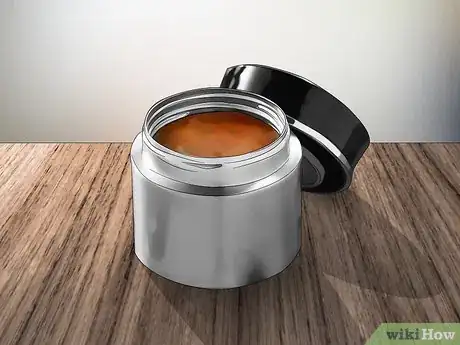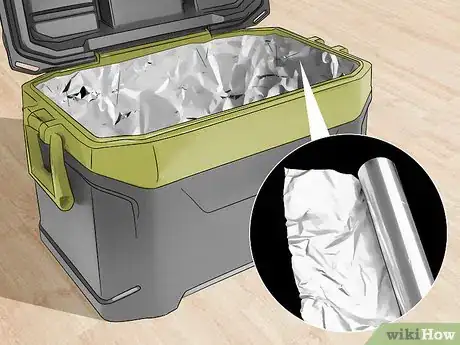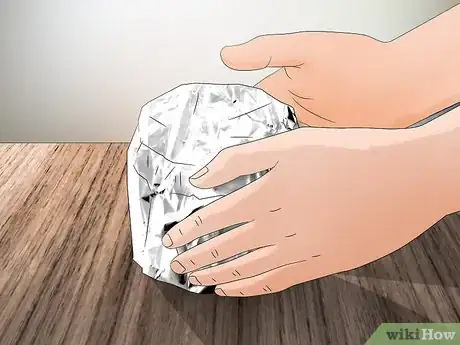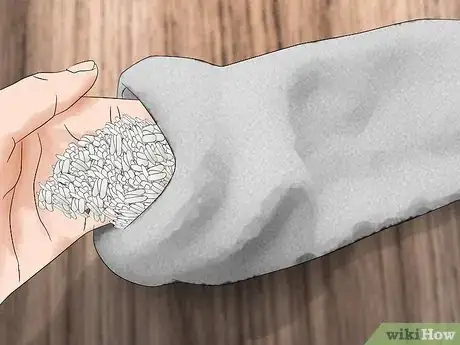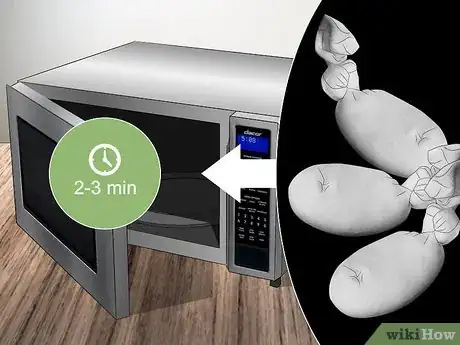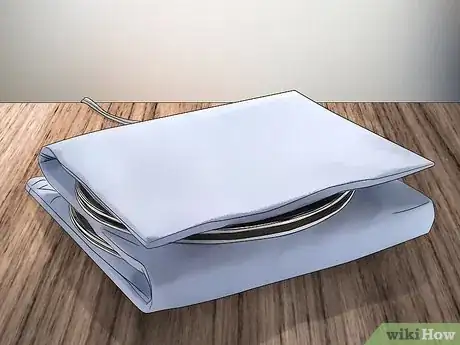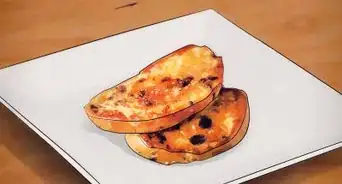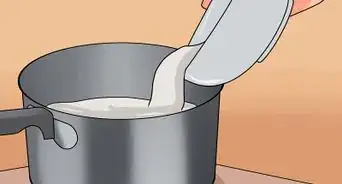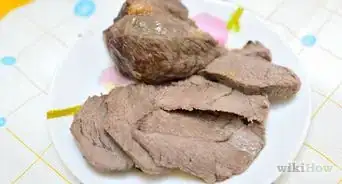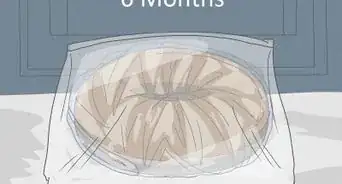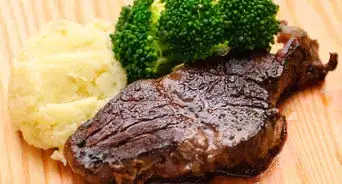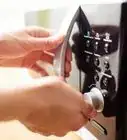This article was co-authored by Jillian Fae Downing and by wikiHow staff writer, Hunter Rising. Jillian Fae Downing is a Private Event Chef, Chef Educator, and the Owner of Jillian Fae Chef Services based out of Temecula, California. With 12 years of experience, she specializes in menu planning and menu research and development. Jillian Fae holds an Associate of Science in Culinary Arts from Orange Coast College and a BA in Mass Communication and Media Studies from Arizona State University. She is also a member of the American Culinary Federation and the American Personal and Private Chef Association.
There are 19 references cited in this article, which can be found at the bottom of the page.
wikiHow marks an article as reader-approved once it receives enough positive feedback. In this case, 100% of readers who voted found the article helpful, earning it our reader-approved status.
This article has been viewed 488,009 times.
Whether you want to keep your meal warm as you're serving it or if you are worried about food safety, keeping your food hot is an important thing to do. Luckily, there are many easy ways to do it right in your own home. You can use your kitchen appliances or insulated containers to keep food warm, use a cooler to make a hot and portable container, or serve your food on warm plates so they don't get cold. No matter how you do it, you can have a hot meal wherever you are!
Steps
Storing Hot Food on the Go
-
1Wrap your food in tin foil and a towel. Without electricity, tin foil is one of the easiest ways to give your food short-term warmth. First, put your food in a sealed container. Next, wrap thick tin foil around the food and be careful not to leave any holes where warm air can escape. Finally, wrap 2-3 towels tightly around the food and foil.
- Depending on the food, this can keep things nice and toasty for anywhere from 30 minutes to 2 hours.
- If you don't have thick tin foil, wrap multiple layers of regular tin foil instead.
- Not only does this method trap steam, but it'll also reflect heat back as well.
-
2Keep soups and stews in an insulated thermos. Transfer your soup into a tall thermos while it is still piping hot. Secure the lid tightly as soon as you're finished putting your food inside. Eat your food within 4 hours so it doesn't cool down and develop bacteria.[1]
- Look on the thermos' packaging to determine how long you can safely store food inside.
- Thermoses are typically only sized for a single serving.
Advertisement -
3Purchase insulated thermal bags for larger dishes. Similar to the bags used for pizza delivery, thermal bags allow you to store dishes so they retain heat while you're on the go. Cover your hot dish with a lid or foil wrap before securing it in the bag. Use a thermal bag for a maximum of 3 hours before serving your dish.[2]
- Thermal bags can be purchased at big box stores or at your local kitchen specialty store. Reusable and disposable bags are available.
-
4Get a portable food warmer to keep foods warm in your car. Find an insulated lunchbox or cooler that can plug into the cigarette lighter jack inside your car. Fill the cooler with hot food and plug it in as you travel. The cooler will use the energy from your car to keep the food at a safe temperature.[3]
- Only have the cooler plugged in as your car is running so you don't drain your car's battery.
- Check the voltage requirement on the bag to see your cigarette lighter can output that much energy. If not, you may cause the cooler to short out.
Using Kitchen Appliances
-
1Set a slow cooker to the “Keep Warm” setting for soups and stews. Let the cooker preheat before you transfer your food into the pot so your food doesn't cool down. The “Keep Warm” setting keeps the food near 170 °F (77 °C) for however long you leave it on.[4]
- Slow cookers work best with wetter foods, like soups, stews, sauces, or mashed potatoes.
- Your food may continue cooking slightly or it may change in texture the longer you leave it in the pot.
- Once you turn the power off, you can safely keep the food warm in the pot for up to 2 hours.
-
2Keep meats and large dishes warm in the oven at 200 °F (93 °C). Preheat your oven to the lowest setting and transfer your hot food into an oven-safe pan. Set the pan on the middle rack and keep it in the oven for up to 2 hours.[5]
- Check the temperature of your food with a thermometer after 20 minutes to make sure it is above 140 °F (60 °C). If not, turn up the temperature slightly.[6]
-
3Make a hot water bath on the stove for foods in pots or pans. Fill a large pan halfway full of water and set it on a medium-low setting on the stove. Check the temperature of the water with a thermometer to make sure it is around 160 °F (71 °C). Place another pot or pan with your food in it in the middle of the water bath.[7]
- You can use this method as long as you keep the stove at low heat and replace any evaporated water with warm water.
- Stir your food occasionally to prevent it from burning on the bottom.
-
4Use chafing fuels under aluminum catering dishes. Remove the cap on the fuel with a blunt object, such as a spoon. Place the chafing fuel container underneath the catering dish before you light it with a multipurpose butane lighter. The fuel will burn for up to 2 hours before it runs out. Extinguish the fuel with the cap or a snuffer when you're finished using it.[8]
- Always use caution when you work with an open flame.
- Chafing fuel can be purchased in a gel or wick form. Both will work the same way.
Making an Insulated Container
-
1Line the inside of a cooler with aluminum foil. Even though a cooler is meant to keep everything cold, you can also use it to keep hot foods hot. Double-layer aluminum foil around the interior of the cooler. The aluminum will hold the heat inside your cooler.[9]
-
2Wrap your container of hot food with another piece of foil. Lay out a large piece of aluminum foil on your counter and set your hot container onto it. Make sure your food is piping hot as you wrap the foil around it. Use a few pieces of foil to cover the container completely.[10]
- Use an oven mitt as you wrap the foil so you don't burn yourself.
-
3Place the container inside the cooler. Set the container in the middle of the cooler. The heat from the container will transfer through the aluminum foil and keep the entire cooler warm.[11]
-
4Make 2 or 3 heat packs by filling new socks with uncooked rice. Fill new cotton socks halfway with uncooked rice. Once you have the rice inside the sock, tie a simple knot on top so none of it spills out.[12]
- Use a string to tie the socks for added security.
- Dried beans will also work similarly.
-
5Microwave the heat packs for 2 to 3 minutes. Use the regular settings on your microwave. Once they are finished, they will be nice and warm and they will hold heat for a while.[13]
-
6Place the heat packs on the sides of your food container. Fill in the large spaces on each side of your food container. This will add more heat to the cooler and help your food stay at a reasonable temperature.[14]
-
7Fill in any gaps in the cooler with towels. Use clean towels so your food doesn't move around while you transport it. Make sure the towels are tight against your food so they insulate the heat inside.[15]
-
8Put a hot water bottle on top of the towels. Fill a rubber hot water bottle with boiling water. It's easiest to pour the water into the bottle from a kettle or a pot with a spout. Place the hot water bottle on top of the cooler for one final heating element to keep your food warm.[16]
- Seal the lid of the cooler tight after you add the water bottle so no heat can escape.
-
9Eat the food within 2 hours. The temperature of the cooler will start to drop over time. Carry a food thermometer with you to check on the temperature of your food to make sure it is above 140 °F (60 °C).[17]
Keeping Your Plates Warm
-
1Microwave the plates to heat them quickly. Stack your plates and put them in the microwave. Keep your microwave on its regular setting and heat them for 30 seconds per plate. Once they are finished, use an oven mitt to remove the plates since they will get hot.[18]
-
2Put the plates in the oven at its lowest setting if they are oven-safe. Preheat your oven to the lowest setting, usually around 150 to 200 °F (66 to 93 °C). Once the oven is hot, place your stacked plated inside and leave them there for a couple minutes. Use an oven mitt to take them out of the oven and let them cool slightly before serving.[19]
- Use a toaster oven that's large enough to fit your plates if you want to preserve energy.
-
3Purchase an electric plate warmer so you can still use your appliances. Plate warmers look like a large foldable heating pad that you can stack plates on. Plug the plate warmer in and turn it on. Wrap the entire plate in the warmer and then place another plate on top. Continue stacking the rest of your plates to heat them thoroughly for 5 minutes before you serve your food.
- Plate warmers can be purchased online or in kitchen specialty stores.
- In a pinch, you can use a large heating pad meant for backs. These can be purchased at your local pharmacy.
Expert Q&A
-
QuestionWhat keeps food hot the longest?
 Jillian Fae DowningJillian Fae Downing is a Private Event Chef, Chef Educator, and the Owner of Jillian Fae Chef Services based out of Temecula, California. With 12 years of experience, she specializes in menu planning and menu research and development. Jillian Fae holds an Associate of Science in Culinary Arts from Orange Coast College and a BA in Mass Communication and Media Studies from Arizona State University. She is also a member of the American Culinary Federation and the American Personal and Private Chef Association.
Jillian Fae DowningJillian Fae Downing is a Private Event Chef, Chef Educator, and the Owner of Jillian Fae Chef Services based out of Temecula, California. With 12 years of experience, she specializes in menu planning and menu research and development. Jillian Fae holds an Associate of Science in Culinary Arts from Orange Coast College and a BA in Mass Communication and Media Studies from Arizona State University. She is also a member of the American Culinary Federation and the American Personal and Private Chef Association.
Private Event Chef & Chef Educator You can always use a warm oven. Most ovens have a warm feature. If your oven doesn't have a warm feature, try keeping it on at 160 or 170 °F.
You can always use a warm oven. Most ovens have a warm feature. If your oven doesn't have a warm feature, try keeping it on at 160 or 170 °F. -
QuestionHow can I keep food warm for 5 hours?
 Jillian Fae DowningJillian Fae Downing is a Private Event Chef, Chef Educator, and the Owner of Jillian Fae Chef Services based out of Temecula, California. With 12 years of experience, she specializes in menu planning and menu research and development. Jillian Fae holds an Associate of Science in Culinary Arts from Orange Coast College and a BA in Mass Communication and Media Studies from Arizona State University. She is also a member of the American Culinary Federation and the American Personal and Private Chef Association.
Jillian Fae DowningJillian Fae Downing is a Private Event Chef, Chef Educator, and the Owner of Jillian Fae Chef Services based out of Temecula, California. With 12 years of experience, she specializes in menu planning and menu research and development. Jillian Fae holds an Associate of Science in Culinary Arts from Orange Coast College and a BA in Mass Communication and Media Studies from Arizona State University. She is also a member of the American Culinary Federation and the American Personal and Private Chef Association.
Private Event Chef & Chef Educator The easiest way would be to pre-cook things and then warm them up quickly in a pan when you're ready to eat.
The easiest way would be to pre-cook things and then warm them up quickly in a pan when you're ready to eat. -
QuestionHow do you keep corn warm?
 KateKatey GirlCommunity AnswerIf it's corn on the cob, leave it in the water you cooked it in. You can also add a little milk and butter in the water after turning off the heat and let the corn sit in it for a few minutes to flavor it. It should keep the corn warm for up to an hour, and the corn soaks up the milk and butter really well. In addition, don't throw that water out! Use it to make potato soup; it gives a great flavor to the broth!
KateKatey GirlCommunity AnswerIf it's corn on the cob, leave it in the water you cooked it in. You can also add a little milk and butter in the water after turning off the heat and let the corn sit in it for a few minutes to flavor it. It should keep the corn warm for up to an hour, and the corn soaks up the milk and butter really well. In addition, don't throw that water out! Use it to make potato soup; it gives a great flavor to the broth!
Warnings
- Keep hot food above 140 °F (60 °C) to decrease the chance of food poisoning. If food is colder than this for 4 hours, throw it away.[20]⧼thumbs_response⧽
Things You'll Need
Using Kitchen Appliances
- Slow cooker
- Oven
- Oven-safe pan or tray
- Range
- Large pan
- Chafing fuel
- Catering tray
Storing Hot Food on the Go
- Thermos
- Thermal bag
- Electric cooler or lunchbox
Making an Insulated Container
- Cooler
- Aluminum foil
- Clean socks
- Uncooked rice
- Towels
- Hot-water bottle
Keeping Your Plates Warm
- Microwave
- Oven
- Electric plate warmer
References
- ↑ https://physics.stackexchange.com/questions/282073/how-long-can-a-thermal-flask-hold-heat
- ↑ https://youtu.be/lys_Zm7gr_o?t=17s
- ↑ https://youtu.be/2-vvq8K0sn4?t=26s
- ↑ https://www.thespruceeats.com/how-to-keep-hot-food-warm-3057587
- ↑ Jillian Fae Downing. Private Event Chef & Chef Educator. Expert Interview. 2 September 2021.
- ↑ https://www.thespruceeats.com/how-to-keep-hot-food-warm-3057587
- ↑ https://www.afamilyfeast.com/how-to-bake-using-a-water-bath/
- ↑ https://youtu.be/O_u3yrEoO-k?t=2s
- ↑ https://youtu.be/GPFY0C0YM2A?t=10s
- ↑ https://youtu.be/GPFY0C0YM2A?t=18s
- ↑ https://youtu.be/GPFY0C0YM2A?t=41s
- ↑ https://youtu.be/GPFY0C0YM2A?t=28s
- ↑ https://youtu.be/GPFY0C0YM2A?t=35s
- ↑ https://youtu.be/GPFY0C0YM2A?t=45s
- ↑ https://youtu.be/GPFY0C0YM2A?t=48s
- ↑ https://youtu.be/GPFY0C0YM2A?t=55s
- ↑ https://youtu.be/GPFY0C0YM2A?t=1m5s
- ↑ https://www.thekitchn.com/tip-warm-the-plates-70284
- ↑ https://www.thekitchn.com/tip-warm-the-plates-70284
- ↑ https://www.fda.gov/food/resourcesforyou/Consumers/ucm109899.htm
About This Article
To keep food hot on the go, put liquids, like soups and stews, into an insulated thermos. For larger, solid dishes, transport them in insulated thermal bags, which you can purchase at most big box stores. If you want to keep food hot at home, you can keep meats and large dishes in the oven at 200 degrees Fahrenheit for up to 2 hours. Or, for foods in pots or pans, you can set them in a large pan filled with water over a medium-low setting on the stove. To learn how to make your own insulated container for keeping food hot, scroll down!
